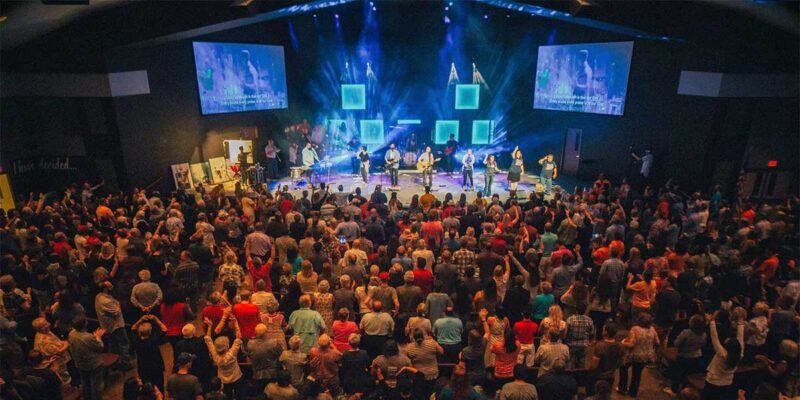House of Worship: Mistakes Will Happen
 The house of worship market is like any concert venue when it comes to the impact of real-time mistakes in front of a live audience. Years ago, I had a humiliating experience that shaped how I taught church tech teams and later designed audio, video, and lighting (AVL) systems. This true story illustrates how a church volunteer or technical staff member can be put into the ‘hot seat’ by a simple accident — or worse, from a mistake that could have been prevented. And it represents a future ‘sales prevention’ issue due to a damaged brand experience.
The house of worship market is like any concert venue when it comes to the impact of real-time mistakes in front of a live audience. Years ago, I had a humiliating experience that shaped how I taught church tech teams and later designed audio, video, and lighting (AVL) systems. This true story illustrates how a church volunteer or technical staff member can be put into the ‘hot seat’ by a simple accident — or worse, from a mistake that could have been prevented. And it represents a future ‘sales prevention’ issue due to a damaged brand experience.
It Was Just Like Every Other Sunday
The feedback pierced the church sanctuary at the very moment the pastor’s prayer ended. Though the sound only lasted less than one second as I quickly pulled the sound console’s faders back down, the damage was done. And that’s when things went from bad to worse.
The pastor glared up at me in the sound booth and nearly shouted into his microphone: “What are you doing?” Mortified, I ducked my head and prayed that the service would end as the pain of my mistake was amplified through the pastor’s words for all to hear.
It was bad enough the accident happened. What made it worse was being called out publicly from the platform for the entire church congregation to hear. It is a both a mistake I’ll never forget and a moment that cemented in me a lie that would take nearly 20 years to uproot: “If it’s not perfect, it’s not good enough.”
Mistakes Will Happen
Some mistakes will be live — and everyone knows about it — while other mistakes will be less obvious. Knowing that mistakes are inevitable is part of the job, as is doing everything possible (training, documenting, more training, consistent systems, even more training) to try to avoid future mistakes. Learning from mistakes is the sign of progress and maturity; beating yourself or team members up for mistakes is a sign of insecurity and fear.
There’s grace in this truth: Flawless execution isn’t perfection.
I think the majority of churches I’ve visited have staff and volunteers that aim for flawless execution. Accidents will still happen, but not nearly as often for a well-prepared team. There is a huge difference between an occasional accident and simply failing to prepare.
It doesn’t matter if an accident happened or unpreparedness slapped the hand of the undisciplined; grace must smother the conversation. A simple technical leadership axiom to remember is this:
“Praise in public; critique and correct in private.”
I wish the pastor would have said “It’s OK. Just a little feedback. Sorry about that,” and then continued on as if nothing had happened. He could have then had a one-on-one conversation to find out what happened and given me any critique or correction he wanted. I would have been an astute, humble listener and appreciative for the private conversation.
Spare Your Church Clients Humiliation
I made a beeline to the pastor after the service to apologize and tell him the issue had been resolved and would not happen again. You’ll notice that I didn’t rush to explain what went wrong because that’s not what a pastor is interested in; they just want to know if you know why it happened and have taken action to solve it (and keep it from happening again). This leads me to the next technical leadership axiom:
“All success is shared. Failure is the sole responsibility of the leader.”
In this instance, if the pastor had apologized (as the overall leader) to the audience, and I’d apologized for my mistake as the leader (or my team’s mistake if the mistake wasn’t directly my fault), the situation would have been smoothed over. I’ll never say to my pastor “Well, volunteer Bob made that mistake today.” As the leader, I take the heat — not the volunteers — and I solve the problems so the pastor has confidence in our team’s ability to execute well and respond well in moments of failure.
People Make Mistakes. Technology Should Not Be One of Them.
In too many churches, the systems integrator of consultant didn’t provide a less stressful operating environment — or, at least, the case is often not made clearly enough to church leaders that ‘value engineering’ functionality out of a system to save money often leaves the operators exposed to technology loopholes and operational dynamics that are sub-optimal. This will always lead to mistakes, and can be mitigated massively in a properly designed (and budgeted and installed) system.
Manufacturers reading this need to understand and own the reality that churches will point fingers at your gear as a point of failure even when the system is really the culprit. I think the box sales mentality of bottom line revenue has hurt the brand reputation of nearly every AVL manufacturer, as there’s a loss of holistic operation when a system is reduced to a line item list of commodities.
Help church leaders and their technical operators alike that mistakes are usually preventable, but accidents will happen because, well… people are involved. Teach them to declare, demonstrate and document to give their tech teams the opportunity for 100 percent preparedness. Over time, they’ll build the relational trust capital to pay the debt of future mistakes.
Manufacturer or systems integrator: don’t stop at selling the gear. Sell training (recurring revenue and invaluable for churches) and spend time in their environment with your gear during a weekend service or two. The peace of mind and brand value you’ll add will be remembered and favorable!





